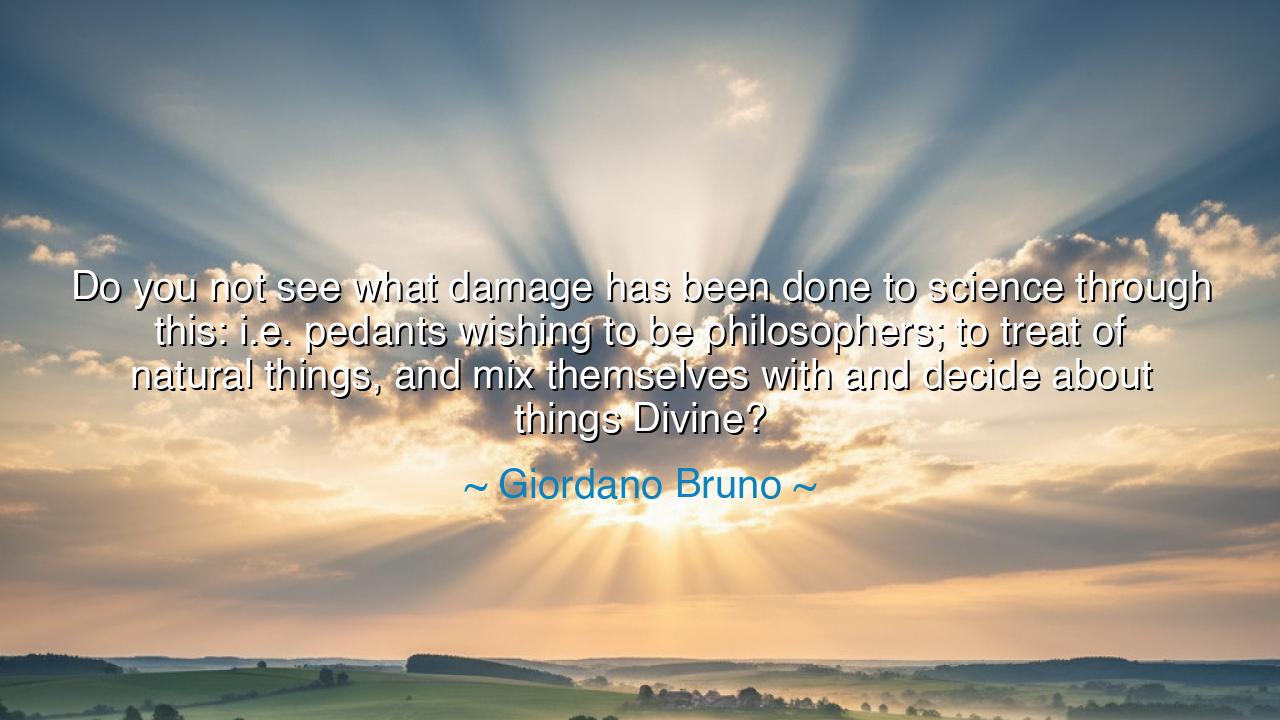
Do you not see what damage has been done to science through this:
Do you not see what damage has been done to science through this: i.e. pedants wishing to be philosophers; to treat of natural things, and mix themselves with and decide about things Divine?






Hear, O children of wisdom, the words of Giordano Bruno, a soul whose brilliance pierced the veil of ignorance in his time, but who also suffered for his courage. He declared, "Do you not see what damage has been done to science through this: i.e. pedants wishing to be philosophers; to treat of natural things, and mix themselves with and decide about things Divine?" These words are not just an observation, but a warning—a call to protect the sacred boundaries between reason and faith, between science and the divine mysteries that lie beyond human comprehension. Bruno speaks of a danger that has always existed, and will always exist: the danger of allowing the pursuit of knowledge to become tainted by arrogance and hubris, when human beings, intoxicated by their own intellect, presume to decide that which should remain veiled.
In the ancient world, the great philosophers and scientists—men like Socrates, Aristotle, and Pythagoras—were humble in their search for truth. They sought to understand the natural world, to uncover its laws, but they did so with the understanding that there are limits to human knowledge. They recognized that the Divine, the forces beyond their understanding, were not to be reduced to mere intellectual exercises or experiments. Bruno's words reflect this ancient wisdom—he warns against those who, in their quest for knowledge, lose sight of the sacred and attempt to use reason to dominate that which is beyond reason.
Consider the tale of Galileo Galilei, whose observations through the telescope revealed the truth of the heavens, overturning centuries of religious dogma. Galileo was not merely a scientist; he was also a philosopher, deeply aware of the conflict between reason and faith. The Church in his time, gripped by authority and unable to separate the spiritual from the empirical, condemned him. Yet Galileo, with great humility, understood that the natural world could be understood through science, but that it did not diminish the grandeur of the Divine. He did not seek to define God or religion, but rather to understand the mechanics of creation. In doing so, he walked the fine line that Bruno speaks of—science must not arrogantly assume the role of philosophy or attempt to explain what lies beyond the scope of human understanding.
The mistake that Bruno warns against is one that has repeated itself throughout history—the mistake of allowing the study of the natural world to become entangled with the desire to control or explain the Divine. Just as there are sciences that help us understand the physical realm, there are mysteries that lie beyond the reach of reason. To seek to explain them with human intellect alone is not to illuminate the truth, but to obscure it. The lessons of history tell us that the Divine cannot be fully known through reason or the scientific method, but only through faith, humility, and reverence for the mysteries that surpass our comprehension.
In our own time, O children of the future, we must heed Bruno’s warning. We live in an age of rapid technological and scientific advancement, where the natural world is being unraveled at an unprecedented pace. Science has brought us great power—the ability to heal, to communicate, and to explore the cosmos itself. But we must not fall into the trap of thinking that the Divine is something that can be contained within the laws of physics or the measurements of chemistry. There are questions that science cannot answer, and there are truths that cannot be explained by the logic of the mind. To attempt to do so is not only arrogant, it is dangerous.
Let us reflect on the lesson that Bruno offers us: there must be balance. The pursuit of science must be accompanied by humility, and the search for knowledge must always be aware of its limits. Science can help us understand the workings of the universe, but it is faith, wisdom, and reverence that allow us to comprehend the mysteries that lie beyond. Just as Galileo did not seek to reduce the heavens to mere measurements, so too must we recognize that the Divine cannot be confined to the realm of human reason.
As you walk your own path, O children of the future, remember Bruno's warning. Seek knowledge, but seek it with humility. Embrace the mysteries of the world, but recognize that some things are beyond the reach of human intellect. In all things, let reason be tempered by reverence, and let your understanding of the natural world never overshadow the awe with which you approach the Divine. In this way, you will walk the path of true wisdom, where science and faith are not in conflict, but in harmony, each enhancing the other, each enriching the soul.






AAdministratorAdministrator
Welcome, honored guests. Please leave a comment, we will respond soon